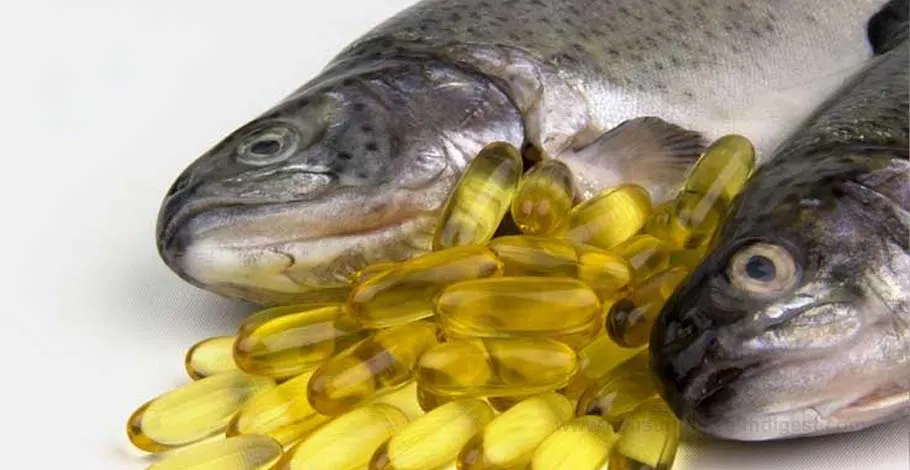In This Article
What are Omega 3 Fatty Acids?
Omega 3 fatty acids are Polyunsaturated Fatty Acids (PUFAs) which are Essential Fatty Acids (EFAs) for a human body. Essential fatty acids (EFAs) are fatty acids that are required in the human diet [1]. They must be obtained from food because human cells have no biochemical pathways capable of producing them internally. Dietary sources of omega 3 acids include fish oil, certain plants and nuts oil.

Docosahexaenoic Acid (DHA), Eicosapentaenoic Acid (EPA), and Alpha Linoleic Acid (ALA) are the major omega-3 Polyunsaturated Fatty Acids (PUFAs). Essential Fatty Acids (EFAs) play a vital part in many metabolic processes, and there is evidence to suggest that low levels of EFAs or the imbalance of types among the EFAs may be a factor in several illnesses.
Plant sources of Omega 3 do not contain EPA and DHA. This is thought to be the reason that absorption of EFAs is much greater from animal sources rather than plant sources and for that the best sources for these fatty acids is krill oil and fish oil.
How Omega 3 Fatty Acids obtained?
According to the studies Omega 3 can be obtained by fish or fish oil supplements like menhaden, mackerel, salmon, tuna, sturgeon, anchovy, herring, sardines, etc.
4 ounces serving of fish provide 1-3 gram of omega 3 fatty acids. Fish oil supplements also contain Vitamin E which is used to prolong their shelf life. These days krill oil viewed as a viable alternative to fish oil to deliver the health benefits associated with EPA and DHA.
Krill oil naturally obtained from a type of crustaceans. Krill is also Norwegian word for “whale food”. Oil from krill is extracted and placed into capsules and mostly used as a form of medicine.
Health Benefits of Taking Fish Oil Vs Krill Oil
Benefit of taking Fish and Krill oil includes:
- Helps lowering elevated triglyceride levels. High triglyceride levels can contribute to coronary heart diseases.
- Reduce the inflammation involved in conditions such as rheumatoid arthritis.
- Help in lowering high blood pressure
- Prevent getting strokes.
- Minimise risk of cancer.
- Improve symptoms of depression and other mental health disorders in some individuals
On the other hand, fish oil is more familiar to general public and has been subjected to numerous studies which explored its health benefits. And they are:

Health Benefits of Taking Fish Oil Vs Krill Oil
- Prevents eye disease age-related muscular degeneration (AMD).
- Reduces risk for preeclampsia.
- Intake of omega 3 pills reduces inflammation and improve the efficacy of asthma treatments
- Reduce the blood’s tendency to clot, which may relate to the clotting that occurs with the initial atherosclerotic plaque.
- Improves mental function in children with attention deficit-hyperactivity disorder (ADHD)
- Prevents weight loss in cancer patients
- Fish oils can be used as a treatment of kidney stones especially calcium oxalate stones.
- Promotes weight loss in obese people as they are considered as good fats.
- -Research does not support omega 3 supplements to reduce blood sugar levels but however they are recommended as a substitute for saturated fatty acids.
Are Fish Oil or Krill Oil Supplements Safe for Everyone?
Krill oil is possibly safe for everyone to use in moderate consumption. Just like its health benefits, the research is not enough to provide information about possible krill oil side effects.
There is evidence from multiple large-scale population (epidemiologic) studies and randomized controlled trials that intake of recommended amounts of DHA and EPA in the form of fish or fish oil supplements lowers triglycerides and raises HDL cholesterol.
However, high doses may have harmful effects such as an increased risk of bleeding. Some species of fish carry a higher risk of environmental contamination such as with methyl mercury. However, it should be taken in moderate dosage.
Recommended intake of fish oil pills for men above 19 is 1.6g/day and for women 1.1 g/day that little rise up to 1.3g/day during pregnancy and lactation.
Side effects of consuming too much fish oil are indicated by:
- Bad breath
- Heartburn
- Loose stools
- Nausea
- Rash
- Nosebleeds
Recommended Dosage of Taking Krill Oil and Fish Oil for Your Health?

Recommended Dosage of Taking Krill Oil and Fish Oil for Your Health?
Krill oil's dose depends on factors like age and health. Krill oil is still not fully examined to determine adequate intake per day.
Before you purchase krill oil you should consult your doctor and ask for a professional advice.
Recommended intake of Fish oil tablets in the following conditions:
- For kidney problems – 1800 mg/day grams per day
- To prevent hardening of the arteries – 1 gram per day
- For depression – 1 gram per day
- Rheumatoid arthritis – 3.5 grams per day
It is of huge importance to take adequate doses to get the best out of your fish oil. Intake of fish oil pills above the upper limit can be harmful to one’s health.
How Do They Differ?
Even though fish oil and krill oil are good sources of omega 3 fatty acids, they aren’t the same. Their first difference is the origin. While fish oil is extracted or eaten in fish, krill oil is extracted from animals that are similar to shrimps. Krill oil & fish oil both have DHA and EPA.
Due to fast absorption, smaller dosage of omega 3 fatty acids in krill oil is as effective as high concentration in fish oil.
| Krill Oil | Fish Oil |
|---|---|
|
|
Krill oil is also consisted of a higher level of astaxanthin, which is an antioxidant that can be found in algae krill eat. A high level of astaxanthin supplement to lower LDL and increase HDL cholesterol.
Is Krill Oil Better Than Fish Oil?
Choosing between fish oil or krill oil is challenging but differentiating both on the basis of rate of absorption and a higher level of antioxidant i.e. astaxanthin, krill oil might have better structure [2]. However, there are no enough scientific researches that would confirm all krill oil benefits.
For now, there is no right answer to this question. It is important to conduct more studies that would focus on krill oil and its benefits mostly because majority of studies about omega 3 fatty acids are concentrated on fish oil supplements.
What Should I Use?
Fish oil has numerous benefits that are scientifically proven. It is safe for everyone, and many studies suggest taking more omega-3 fatty acid supplements than is recommended during pregnancy and lactation because it aids in the brain development of an infant [3].
On the other hand, krill oil is relatively unexplored and in case you do want to give krill oil a try, you should consult your doctor first.
Krill Oil Vs Fish Oil - Conclusion
Krill oil or fish oil are great sources of Omega 3 fatty acids that are essential for our health. However, no evidence-based studies are there to explain the benefits of krill oil and additional studies needs to be done to confirm its possible health benefits.
How Much Fish Oil Should You Take? Please share your views in the comment box.
3 Sources
We review published medical research in respected scientific journals to arrive at our conclusions about a product or health topic. This ensures the highest standard of scientific accuracy.
[1] Omega-3 Fatty Acids EPA and DHA: Health Benefits Throughout Life1: https://www.ncbi.nlm.nih.gov/pmc/articles/PMC3262608/[2] Astaxanthin in Skin Health, Repair, and Disease: A Comprehensive Review: https://www.ncbi.nlm.nih.gov/pmc/articles/PMC5946307/
[3] Omega-3 Fatty Acid Supplementation During Pregnancy: https://www.ncbi.nlm.nih.gov/pmc/articles/PMC2621042/







 This article changed my life!
This article changed my life! This article was informative.
This article was informative. I have a medical question.
I have a medical question.
 This article contains incorrect information.
This article contains incorrect information. This article doesn’t have the information I’m looking for.
This article doesn’t have the information I’m looking for.